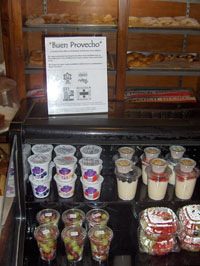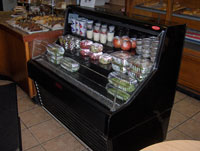by Adam Becker, PhD, MPH, Executive Director
Partners and friends,
April marks the beginning of the second quarter of our 10th anniversary year! This quarter, we are focusing on two of the hallmarks of the consortium’s operations – our community work and partnerships as well as public education in community settings.
Community partners are really what make CLOCC a consortium. When we started ten years ago, community organizations and advocates were among the first groups to get involved with the consortium and help to spread the word about the growing obesity epidemic in Chicago. The partnerships that formed and the voices of community partners shaped CLOCC’s mission, priorities, and intervention strategies. At the beginning, we literally built CLOCC organization by organization until we honed community intervention strategies that allowed us to bring partners together more effectively. Once a critical mass of organizations engaged, we formed working groups with specific areas of focus and expertise.
Working Groups continue to be an important engine for the consortium. Although they emerge and dissipate as the needs and interests of the consortium change, and they take different approaches to process and structure, all of them serve three primary functions:
• Keeping the consortium connected to the particular sector they represent and ensuring that the information and resources the consortium has is made available to that sector.
• Ensuring that the consortium as a whole learns from the expertise of those sectors.
• Helping to develop effective strategies for obesity prevention within that sector – sometimes leading to specific funded strategies.
While CLOCC has been and will remain open to partners from communities across Chicago and beyond, leadership agreed early on that we needed to hone our understanding of, and strategies for, addressing the challenges and opportunities for obesity prevention at the neighborhood level. To that end, we partnered with organizations in a few diverse Chicago communities. In 2004, we identified six communities (our “Vanguard Communities”) in which to place neighborhood-based staff and pilot community interventions. We expanded to ten Vanguard Communities in 2006. These community-based staff and their partners helped the consortium as a whole to learn effective ways to reach children, families, and the organizations that serve them. We learned what schools needed and contributed, how parks figure into the community landscape, who was involved in healthy food access activities, and what community priorities were for research and advocacy. In Humboldt Park, our partnership with the Puerto Rican Cultural Center and the Sinai Urban Health Institute, combined with funding from the Otho S. A. Sprague Memorial Institute, resulted in the development of Community Organizing for Obesity Prevention (CO-OP), a key coalition-building strategy of our community-level work. CO-OP was expanded through iterations in Englewood and Pilsen. The CO-OP strategy mobilizes existing community leaders and organizations, supports their collaboration to develop intervention strategies, promotes healthy eating and physical activity at the community level, and links clinical practices to community programs. Specific strategies that are locally relevant emerge under the guidance of CO-OP coalition leaders and members help identify and connect to approaches from other neighborhoods. The CO-OP HP experience is described in-depth in a book edited by staff at SUHI and will soon appear in a new edition of a classic book on community organizing for public health. Although the formal CO-OP structures in the three neighborhoods have merged into other local initiatives, CO-OP remains an option for CLOCC’s engagement in new communities.
In 2011, after a year of review and discussion with CLOCC staff and leadership, we decided to expand from a community-by-community model to a regional approach. Because the field of obesity prevention has matured and we have identified an emerging set of strategies in use in Chicago and across the country that have the most promise for creating change, we are shifting our approach in order to support and engage with more communities across Chicago to ensure that they too have access to this promising set of approaches. Our Community Networkers, formerly assigned to one specific vanguard community, have transitioned into a new role: Community Program Coordinators. In this new role, CLOCC’s community-based staff will connect to more Chicago neighborhoods and bring specific strategies, along with training and support to increase the likelihood of success to partners who are committed to obesity prevention and health-related work. Beginning this quarter, Community Program Coordinators will begin working in city regions – North, West, Southwest, Northwest, and South. We are excited about the new relationships we are already beginning to establish as a consortium as we move to this new model and look forward to connecting to partners in new and innovative ways.
One of the biggest resources we are able to bring to our community partners is our public education message, 5-4-3-2-1 Go!®, and the tools for training and dissemination that come along with it. The message was developed by CLOCC in 2004, and to date thousands of community partners have been trained on it. Our vision is one of “surround sound messaging” in which children, families, and those who interact with them will see our message everywhere they go, reminding them of the five important elements of a healthy lifestyle – designed with young children in mind but healthy for everyone. To realize this vision, we blanketed Chicago with 5-4-3-2-1 Go! posters, billboards, and CTA advertising in the fall of 2009 as part of a citywide advertising campaign. Hundreds of CLOCC partners helped with distribution, participated in special events, and disseminated the message to their own constituencies. 5-4-3-2-1 Go! materials have been downloaded in 49 states and 18 countries around the world. The demand for 5-4-3-2-1 Go! became so great that we brought on a full-time Health Educator in 2009 to focus exclusively on message training and outreach.
The future of our community work and public education outreach looks bright. Our Healthy Places initiative has helped us to develop and hone a diverse set of environmental change strategies to improve access for all Chicagoans to healthy food and safe opportunities where they live, work, learn, and play – especially in those communities where access is insufficient and obesity-related health disparities occur. Many of these strategies are based on those we piloted in CLOCC’s early work in the vanguard communities. We expect to provide training and technical support to community organizations across the city to support implementation of these new strategies. We will continue to offer free trainings several times a year so interested organizations can learn about 5-4-3-2-1 Go! and explore ways to integrate it into their programming. We are also developing a pilot project to work with organizations to integrate 5-4-3-2-1 Go! more deeply at their organizations in addition to using it in their programs; ensuring that organizational practices, policies, and environments are aligned with the message. As interest in the message grows locally and across the region and nation, we will explore new opportunities to support its use.
CLOCC staff and leadership are grateful to all of the community partners who help keep our consortium strong and vibrant. We are humbled by all that they have taught us. We look forward to new and exciting ways to build on and expand this critical element of our collective work. As a special way to celebrate our community partners during our 10th anniversary, we have launched the We are CLOCC contest with a $2,500 prize – go here for more information.
Next quarter, we will continue along the theme of partnerships and take a deeper look at some of our very unique partnerships beyond those in geographic communities. My July blog post will explore the consortium’s work with corporations, government, schools, and the clinical sector. Talk to you again soon!






